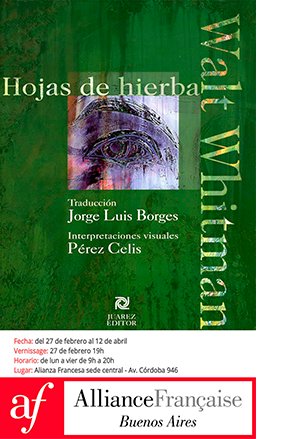Luisa Richter
Sala Mendoza. Universidad Metropolitana, Caracas
Luisa Richter (Germany, 1928) once told us that one of the reasons why she did not leave Venezuela was her attachment to her house and her fascination for the light of the tropics.

The house, situated in the suburbs of Caracas, was designed by architect Augusto Tobito – who was an assistant to Le Corbusier in Paris. I had the chance of sharing classes with Tobito, as professors at the Faculty of Architecture of the Universidad Central of Venezuela – under the severe gaze of the coordinator, architect Ramón González Almeida. In this workshop, the importance of managing the climate, of environmental conditioning, and of the economy of media, was stressed. The young students of architecture of our days do not even know of the significance of these two great architects.
Richter does. She enjoys the white of the double height walls of her residence that absorb the intense colors. She is the mistress of collage in Venezuela. Winner of all the national awards granted in her country of residence, she understands collage as a way of viewing life, as a sort of assemblage of snippets glued like stamps which narrate the footprint of life.
Her pieces are superimposed elements which, in the most interesting ones, transmit the feeling of depth and infinite void. In others, she places images, photographs, but often those made with pieces of cloth glued together and intervened with oil or pastels, are the ones that trap us, the ones that in a quiet way lead us to a state of reflection.
There is another additional element which calls our attention. The colors are often tones of grey and white, but suddenly a blot of color may appear – generally yellow −, and then the works “ shout” that they have been performed by a German artist who lives in the tropics. An artist who, unlike the German artists-travelers of the 19th century, has deciphered the mysteries of these lands. The colors are not gestural; they are rather the product of a process of reflection, so that the profound and unlimited space is a shout of anguish which is universal.
-
 Woodstock, 1969-2011. Collage of diverse materials, 34.3 x 22.2 in. Photograph: Ricardo Gómez-Pérez. Collage sobre materiales diversos, 87,2 x 56,5 cm. Fotografía: Ricardo Gómez-Pérez.
Woodstock, 1969-2011. Collage of diverse materials, 34.3 x 22.2 in. Photograph: Ricardo Gómez-Pérez. Collage sobre materiales diversos, 87,2 x 56,5 cm. Fotografía: Ricardo Gómez-Pérez.




